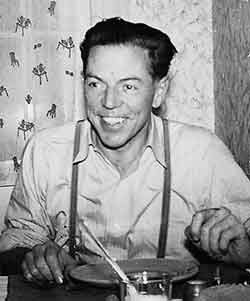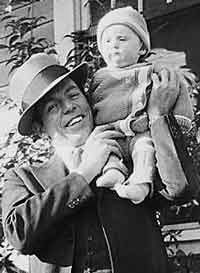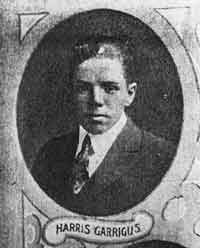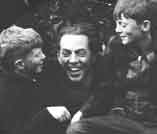After I had completed the first draft of this book, I was able to secure the services of one of the best editors I know. She told me she was giving me a big discount from her usual price, and instead of thinking, “Yeah, sure!” I actually believed her because we were once married and we had shared not only the upbringing of our three children but also a joint bank account.
So when Vivian Garrigues had given the manuscript a good read, she asked me to come to her place, gave me a cup of coffee, looked at her notes and said:
“Let’s sum up: This is a book of your dad’s letters — of Brick’s letters. They begin in 1925, and the reader starts tentatively with ‘This man is fascinating, but insensitive and arrogant. Who the hell does he think he is?’ Then we watch him changing, sometimes awkwardly, sometimes with an amiable acceptance, and finally — over a half century — he eases into maturity. At the end the reader closes the book and says, ‘Now I understand.’”
“Well, yes. I hope so. But?” She’s going to pounce, I thought.
“But in the first half, how long do you suppose the reader will stick with this, if you’ll pardon me, insensitive and womanizing man? To me — to any woman — there are too many instances in this manuscript of his smugness and obtuseness. You need to chop it.
“The major point,” she added with certainty, “is that, at least in the beginning, Brick is very interesting, but not very likeable. He seems to make a pass at every woman he sees, and he doesn’t hesitate in his letters to let his ‘sweetheart’ know about it! Why on earth did Dickie” — that’s the sweetheart — “put up with it?”

“Well, you knew the man,” I replied. “You know how charming he could be.”
“You wouldn’t have been on my short list for marriageable mates if I’d received a letter like this one!” She turned right to January 15, 1926, which she’d marked with a Post-It.
“I never wrote one,” I reminded her.
She said nothing; she just raised an eyebrow. She is the only woman I have ever known who could actually do that.
Then she said: “We need more stuff in the first few chapters like Brick’s remark about his delighted mother not talking much about anything but Dickie.” She pointed to it. “It’s a very sweet remark; normally he doesn’t talk sweet at all; he talks smart, witty and glib. The sweetness is that he is already speaking of Dickie as though she were part of the family.”
“Well, first, I can’t make stuff up. This book is real; it is not fiction.
[Except for this foreword, which is put together from various telephone conversations, e-mails and letters that Vivian and I exchanged over many months. And some poetic license in Part Three involving a daemon and a goddess. And I changed the names of some of the people whom Brick wrote about, did a massive amount of cutting of his letters and some editing I think Brick would have agreed with.]
“Second, I’ve got to show he has a roving eye, so that the upheaval in Chapter Ten — that tragic fall — doesn’t come as a big surprise. Third, he’s in his journalistic mode, and journalists of that era thought of themselves as hard-boiled and unsentimental.”
“Women will not like this book,” she enunciated clearly.

“They may not like the man — for a while — but they’ll like the book.” I felt sure of it.
“And men? Well, young men can relate to Brick’s early smugness. Middle-aged men can recall the joy they felt at the birth of their first child; the trauma they may have gone through in a divorce” — she looked a little thoughtful at that — “the failure they felt in themselves when the money wasn’t there, the feeling that life is passing them by.
“And the oldest men of all, those guys you see on the park bench or shuffling down the sidewalk. In some ways, I like that ‘Feeling of Finality’ chapter the best. That decay comes to all of us, men and women. You know, Shakespeare’s Seventh Age.”
Vivian riffled the manuscript.
“But this ‘Janet’ chapter? So many devious things come up beforehand that when the reader reaches the ‘Janet’ chapter, he or she might shout, ‘Enough, already!’ and throw the book down. It should be eliminated!”
That one stopped me. I had really been greatly amused at my father’s taking such pains to break up the romance of his young woman friend with a man he thought didn’t suit her. Still, I did have the feeling that Brick blabbered on much too much about his scheming.
“I’ll go through the chapter and see if I can cut or paraphrase.”
She seemed somewhat mollified and then read aloud from her notes:
“The book is most strongly the story of Brick’s life — from the young man who wants to swallow the world and everything in it in one huge gulp — to the older man who is content with his small piece of the world, something interesting to read and good music playing quietly on the stereo.
“Intertwined with the playing out of Brick’s life is his need to be a ‘writer.’ Sometimes it plays out in a major theme with a full brass section, and sometimes it recedes to a minor theme with piano and violin playing softly in the background. This works.

“Theme three — his struggle to come to terms with a defining incident in his teenage years — this is the weakest. This theme drops in, says ‘Hi,’ and leaves for a period of time, wandering back ever so often to say ‘Hi!’ and ‘Gotta run now.’ ”
I looked at her.
“That is really good. Listen, you write a book and I’ll be the editor!”
We both laughed, and then I said: “But I think you’re ignoring the very strong theme of family. And the Twentieth Century family was not like his Mama and Papa and their five kids. It’s more like Brick’s and his friends’ and his children’s families. Oh, gosh, there must be half a dozen divorces in that manuscript. And yet family is the theme from the first page to the last.”
“Oh, yes.” She smiled. “That ‘Kids’ chapter. That was so precious — in the best sense of the word.”

“Thanks. I enjoyed writing it.” More than enjoyed; I had relived those scenes of my childhood, when my brother and I spent the summers with our father, causing him some grief but much joy. Of course I didn’t know how he felt about it all until I pulled his letters out of the envelopes in which they had lain for so many years and read them — some of them for the first time.
And then I said, “You know, there was a period in my life — oh, just about the time Lisa was a toddler — when I thought Brick was just a big blowhard, and my mind is a blank about a lot of what happened between us. That’s why researching and writing this book has been so important for me.”
She nodded. In sympathy, I thought with some annoyance. “And that’s why you want to call it Brick’s Book?
“Yeah, well, it has a double meaning. The letters he wrote — they make up his ‘Book.’ And his life was so much driven, even from the beginning, by his need to write a book, the Book.”
She was gentle but still firm: “Brick’s Book is not going to fly off the shelves. Instead, use that title you have for Chapter Thirteen: ‘Usually Lives With a Female.’ ” Can anybody resist picking the book up and looking inside it with a title like that?”
I guess I made a face. A title like that seemed so, well, dismissive. And yet . . . it was certainly true enough. “Hmm. Maybe if it were a complete sentence: HE Usually LIVED With a Female. If we go that route at all.”
And that’s where we left it for a few days. I didn’t care for Vivian’s suggestion. But then I figured I would ask my deceased father himself what I should do. So I imagined this conversation:
“What about that new title, Pop? Give me your honest opinion.”
“Will it sell easier that way, son?”
“Vivian says it will.”
“I’ve always said that Vivi has the most brains of any Garrigues I know. And remember, son, the most important thing for a book is . . . to get read!” And he turned back to his typewriter.
I phoned Vivian and told her what Brick had said about the title.
“Good. But there’s something else.” Uh-oh, I thought.
I had to write an introduction, she said.
“When I’m browsing in a bookstore, if I find a book that entices me by the cover,” she explained, “and it isn’t a book by an author I’ve heard of, nor about anybody I’m familiar with, I turn to the introduction to see if this book will hold my interest. The intro will pique my curiosity (or not), and if I am in a buying mood, I’ll buy it.”
There would be a lot of reasons for a publisher to turn down the manuscript, she said — “ironically, none of them relating to the quality of the book” — so it’s imperative to write a preface that would sum up the whole thing.
“So stew for a while, then write a knockout intro and let me see it.”
So I did.